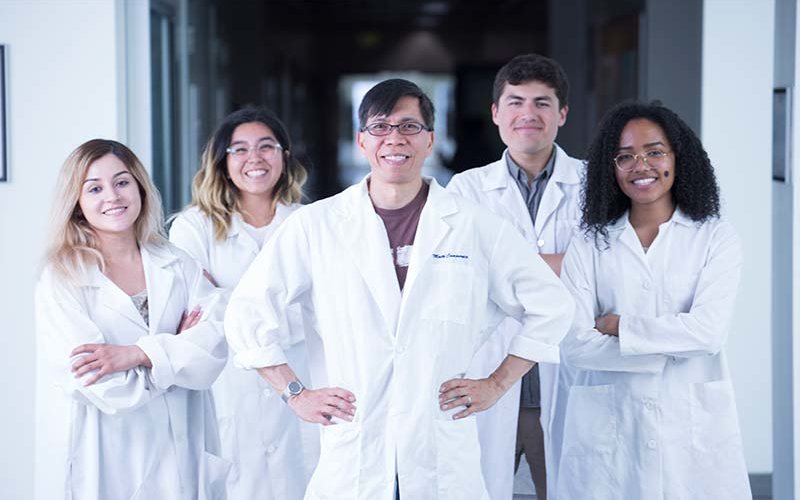
Inside his lab at Cal State Fullerton, biological science professor Math P. Cuajungco and his students are investigating pathological processes and potential therapeutics for Mucolipidosis IV, a neurodegenerative disease afflicting some Ashkenazi Jewish children.
The neuroscientist, who conducted predoctoral research on abnormal zinc metabolism in Alzheimer’s disease at Harvard Medical School, is making pioneering advances in his research for Mucolipidosis IV, which he has been studying for more than 10 years.
“We hypothesize that zinc may play a possible role in the disease process occurring in Mucolipidosis IV. Our recent results using the next generation sequencing technique support it,” said Cuajungco, who is finalizing his latest paper on the findings for journal publication.
For his broad record of research achievements, Cuajungco’s scientific work has not gone unnoticed by his colleagues. He has been selected as the recipient of the 2019 Faculty Research Award from the California State University Program for Education and Research in Biotechnology (CSUPERB).
The CSUPERB Selection Committee wrote, “To support his lab’s research, Math has been highly successful in obtaining several major research grants from federal agencies including the National Science Foundation and National Institutes of Health. Additionally, Math has been an exceptional research mentor. His mentees include not only the students in his lab, but also dozens of undergraduate students from (CSUF’s) Research Careers Preparatory, MARC, HHMI and Bridges to Stem Cell Research programs.”
“I’m very honored to receive this award and I’m grateful to my CSUF and CSU colleagues for recognizing my research accomplishments,” said Cuajungco, who joined the university in 2007 and received the 2018 L. Donald Shields Excellence in Scholarship and Creativity Award.
Cuajungco has received nearly $1 million in research grants and has published more than 40 peer-reviewed papers. He earned his doctorate in neuroscience from the University of Auckland, New Zealand, and continued research work at Harvard Medical School. At Harvard, he helped discover the gene that causes familial dysautonomia, a degenerative brain disease that affects certain children of Ashkenazi Jewish descent. He conducted postdoctoral work at Stanford University and studied human proteins that are involved in the ability to hear.
Cuajungco will be presented with the award on Saturday, Jan. 5, at the 31st annual CSUPERB Symposium at the Hyatt Regency Orange County in Garden Grove. The Jan. 3-5 symposium brings together students and faculty members from across CSU campuses, along with biotech professionals working in academia, government and industry. CSUF students will be attending the symposium, as well as presenting their research projects.
As the award recipient, Cuajungco is giving a talk from 10:45-11:45 a.m. Jan. 5, on “Mucolipidosis IV Parallels the Pathology of Some Age-Related Brain Diseases.”
Marcelo E. Tolmasky, professor of biological science and 2018 CSUPERB Andreoli Faculty Service Award recipient, nominated his colleague for the award. He noted that Cuajungco has made thoughtful and valuable contributions to the profession and the university, including attracting a large number of undergraduates and graduate students to his research group.
One of those student researchers is Mohammad Samie, Cuajungco’s first graduate student who earned his master’s degree in biology in 2009. Samie, who holds a doctorate from the University of Michigan, is a scientific researcher at Sangamo Therapeutics Inc., a biotechnology company based in Richmond, near San Francisco.
“His passion for science, enthusiasm, integral view on research and his mission for providing high-quality work has made a deep impression on me,” Samie relayed in his letter of support for his faculty mentor. “What I admire most about Dr. Cuajungco is his remarkable ability to stimulate his students when experiments don’t work. His mentoring style promotes creative thinking, and he does a great job guiding his students through the ups and downs of research.”
For more information about the CSUPERB Symposium program, visit online.